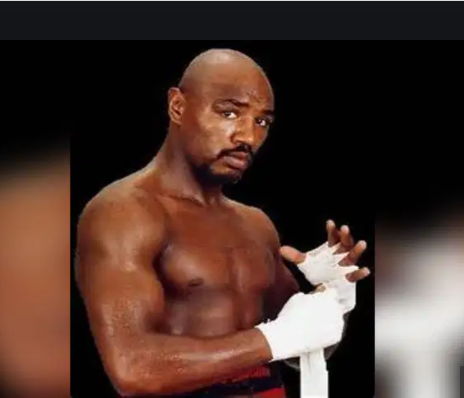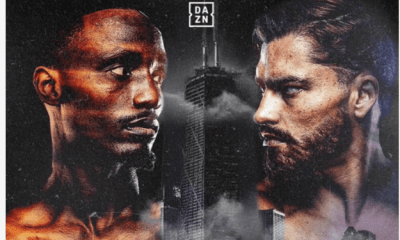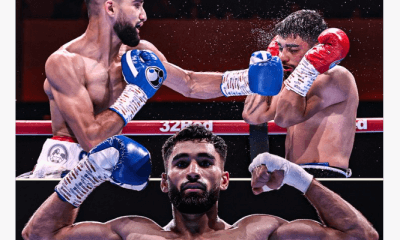Featured Articles
Saying Goodbye To Our Guy, Marvelous Marvin Hagler Gone At 66

On Saturday night March 13, 2021, the sporting world at large was shocked to learn of the sudden death of former undisputed world middleweight champion Marvelous Marvin Hagler.
The internet reacted immediately to a social media posting on Facebook originating from a Marvin Hagler Fan Page administered by Hagler’s second wife, Kay Hagler, who broke the terrible news: “I am sorry to make a very sad announcement. Today unfortunately, my beloved husband Marvelous Marvin passed away unexpectedly at his home here in New Hampshire.”
The Newark, New Jersey born pugilist was just 66 when he died at or near his summer home in Bartlett, NH. Hagler was not known to be ill or in poor health. A scroll through his recent social media reveals a man engaged in sporting activities such as 50 mile bike rides. It’s been reported he enjoyed a meal at the Lobster Trap in North Conway, NH just four days before his death. Staff at the nearby Red Parka Pub also spotted Hagler at their establishment on that Tuesday.
Considered by many to have possessed the sturdiest chin in boxing history, Hagler was never legitimately knocked off his feet nor was he ever knocked out in the ring. What John “The Beast” Mugabi and other big punchers could not do (stop Hagler) the Grim Reaper has finally done.
Though his official cause of death remains unknown at this time, there has been some speculation that Hagler could be another casualty of the coronavirus. After his retirement from boxing in 1987, Hagler relocated to Italy and quietly lived there for many years with his family. It is well known that Italy was the first country to be significantly affected by the Chinese pathogen.
Hagler always claimed that if they opened up his bald head, they’d find a boxing glove in there, that he lived and breathed boxing, that it defined him in a way that nothing else in life ever could.
Always physically fit and ready to rumble, he successfully defended his world title a dozen times, twice by knockout in 1981 at the Boston Garden. A true New England sports legend, Hagler lived and trained in Brockton, Massachusetts before moving to Hanover after taking the middleweight crown off Alan Minter in 1980 at London’s Wembley Stadium. Infamously, Hagler was forced to take cover and flee as angry British fans pelted the ring with bottles and debris.
It was not the first time Hagler was forced to flee from violent rioters. In the wake of the destructive race riots that rocked Newark, NJ in 1967, Hagler’s mother Ida Mae evacuated the fatherless teen up north to Brockton in search of a better life. After suffering a bad beating on the streets at the hands of a boxer named Dornell Wigfall, Hagler found his future in the boxing gym.
In 1973, Hagler got revenge, knocking out Wigfall at Brockton High School in just his 4th pro bout. They met again two years later at Brockton High and Hagler again knocked him out.
Trained for his entire professional career by Goody and Pat Petronelli, Hagler and the two Brockton brothers formed an unbreakable triangle built on unwavering loyalty, consistency and respect. Hagler was equally loyal to the late Angie Carlino, his longtime personal photographer.
Hagler made headlines in 1982 when he legally changed his name from Marvin Nathaniel Hagler to Marvelous Marvin Hagler. He did this so that ring announcers and defiant color
commentators would be forced to call him by the name he’d so marvelously earned and identified with.
With a record of 62-3-2 with 52 knockouts, Hagler was best known for his Superfights with Thomas Hearns, Roberto Duran and Sugar Ray Leonard. He is lesser well known for his role in the Italian produced Indio films. Hagler fought 22 times in Boston, winning all 22 including a pair of wins against Sugar Ray Seales. In 1993, he was enshrined at the International Boxing Hall of Fame in Canastota, NY.
“Marvelous Marvin Hagler’s name is synonymous with greatness,” said Hall of Fame Executive Director Edward Brophy. “One of the best to ever step into the ring, he combined skill and determination to dominate the middleweight division during his championship career.”
Brockton Mayor Robert Sullivan issued a proclamation on behalf of Hagler’s adoptive hometown. “The City of Brockton and the boxing world has suffered a devastating loss today with the passing of Marvelous Marvin Hagler, former Undisputed Middleweight Champion of the world. Marvelous Marvin will always be a champion from our ‘City of Champions’ and he inspired civic pride in generations of Brocktonians. He will be remembered as the dominant Middleweight fighter of his era. His championship boxing matches captivated Brockton and the world and became instant classics. Our thoughts and prayers go out to the Hagler family.”
Hagler’s Top Rank promoter Bob Arum had the following to say about a fighter who “embodied everything noble” about boxing. “Marvin Hagler was among the greatest athletes that Top Rank ever promoted. He was a man of honor and a man of his word, and he performed in the ring with unparalleled determination. He was a true athlete and a true man. I will miss him greatly.”
Thomas “The Hitman” Hearns was the first of Hagler’s boxing rivals to comment publicly on his passing, inexplicably doing so before he’d actually passed. What Hearns wrote on Instagram Saturday created a firestorm reminiscent of their ‘Fight of the Year’ war in Las Vegas. For reasons as yet unknown, Hearns wrote that Hagler was “in ICU fighting the after effects of the vaccine.” On Marvin Hagler’s official webpage, “natural causes” are vaguely cited in his death.
The “Destruction and Destroy” website MarvelousMarvin.com contradicts the statement of Kay Hagler that her husband died “at” their Bartlett home and states that Hagler died “near his home” in New Hampshire on March 13 as widely reported. Perhaps we’ll never know the full story.
According to TMZ, Hagler’s son James told the online tabloid that his father was taken to a New Hampshire hospital earlier on the day he died; after complaining of shortness of breath and chest pains. It’s not known if any of this is true or if Hagler was discharged and released.
Or if he went to a hospital at all.
A reasonable person might conclude Hagler ate some bad seafood somewhere and perhaps succumbed to food poisoning. What’s more likely is that Hagler was enjoying the unseasonably mild weather in the New England area and was outside doing something physical when struck down by a heart attack or a stroke. In the ring he was “unknockoutable” but life hits harder.
On the Monday after his death, Kay Hagler issued another heartfelt statement on the Marvin Hagler Facebook page. The Italian widow apologized for her poor English before stating that she is “the only person that know how things went, not even his family know all the details. I was the only person close to him until the last minute.”
Mrs. Hagler is adamant that the coronavirus vaccine had nothing to do with Marvin’s death and that he died in peace with a smile on his face. Surprisingly, she also wrote that Marvin “hated funerals” and thus there would not be one for him or any “church celebrations” planned.
Sugar Ray Leonard spoke to Sports Illustrated’s Chris Mannix on the night Hagler died, telling the reporter that his middleweight title fight with Hagler was the “closest I’ve been” to death.
After losing his middleweight championship by controversial split decision to Leonard in 1987, Hagler resisted the urge to come back and seek a rematch. Instead, he retired with his faculties and his fortune intact. Hagler never accepted or acknowledged the legitimacy of his defeat to Leonard, forever claiming it was the dirty politics of boxing that was his true undoing.
“I still feel as though I’m the champion,” claimed Hagler after the loss to Sugar Ray. “I fought my heart out to keep my belt. I think I’ve done a lot for boxing. I’ve been a true champion to the sport. It puts a bitter taste in my mouth the way they went and did this. It’s just not right.”
Rest in Peace Marvelous One.
—
I’ll never forget meeting you for the first time at Brockton High School in 1980. I was 10. You were in the gymnasium conducting a very sweaty public sparring session with your half-brother Robbie Sims. I ran around getting every autograph I could on a black-and-white headshot of you handed out to everyone in attendance. I wish I still had it. Every Hagler friend or family member signed it, your trainers, and even your publicist. When it came time for you to sign my picture, there was no room left on the front so you humorously flipped it over and signed the back.
Thanks for always being our guy.
Boxing Writer Jeffrey Freeman grew up in the City of Champions, Brockton, Massachusetts from 1973 to 1987, during the Marvelous career of Marvin Hagler. JFree then lived in Lowell, Mass during the best years of Irish Micky Ward’s illustrious career. A former member of the Boxing Writers Association of America and a Bernie Award Winner in the Category of Feature Under 1500 Words, Freeman covers boxing for The Sweet Science in New England.
Check out more boxing news on video at the Boxing Channel
To comment on this story in the Fight Forum CLICK HERE
-

 Featured Articles3 weeks ago
Featured Articles3 weeks agoResults and Recaps from New York Where Taylor Edged Serrano Once Again
-

 Featured Articles1 week ago
Featured Articles1 week agoThe Hauser Report: Zayas-Garcia, Pacquiao, Usyk, and the NYSAC
-

 Featured Articles2 days ago
Featured Articles2 days agoOscar Duarte and Regis Prograis Prevail on an Action-Packed Fight Card in Chicago
-

 Featured Articles3 weeks ago
Featured Articles3 weeks agoResults and Recaps from NYC where Hamzah Sheeraz was Spectacular
-

 Featured Articles4 weeks ago
Featured Articles4 weeks agoFrom a Sympathetic Figure to a Pariah: The Travails of Julio Cesar Chavez Jr
-

 Featured Articles2 weeks ago
Featured Articles2 weeks agoManny Pacquiao and Mario Barrios Fight to a Draw; Fundora stops Tim Tszyu
-

 Featured Articles4 weeks ago
Featured Articles4 weeks agoPhiladelphia Welterweight Gil Turner, a Phenom, Now Rests in an Unmarked Grave
-

 Featured Articles2 weeks ago
Featured Articles2 weeks agoArne’s Almanac: Pacquiao-Barrios Redux




















